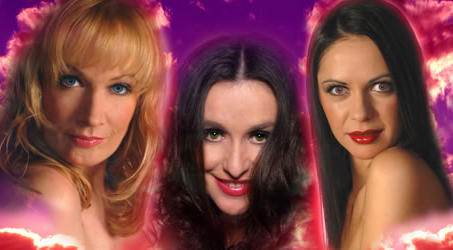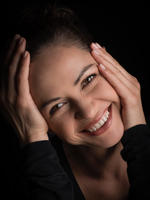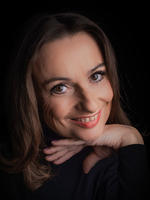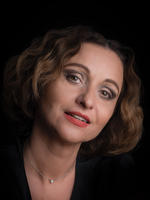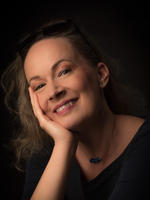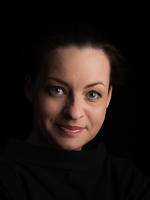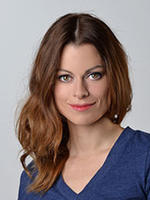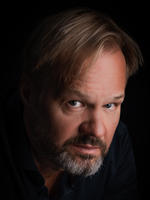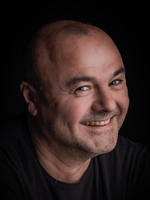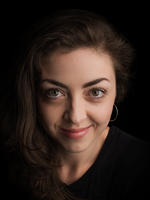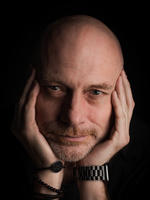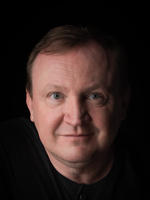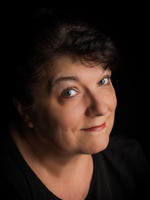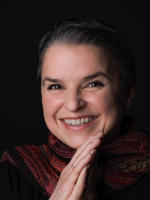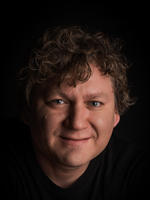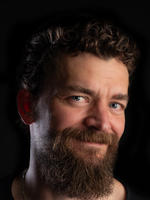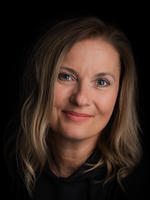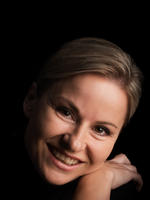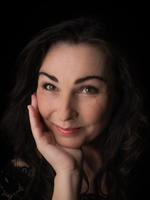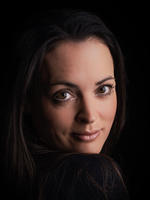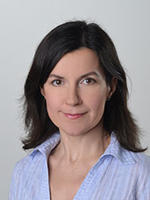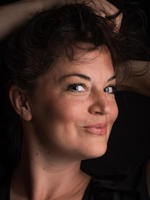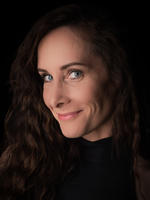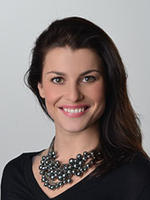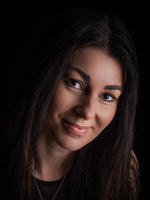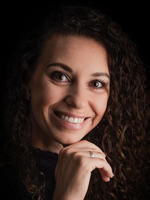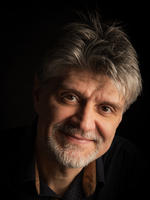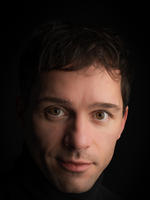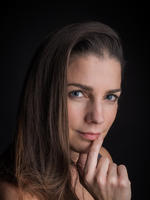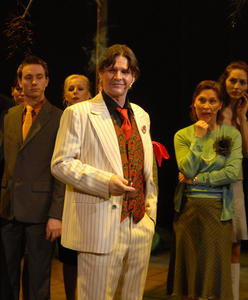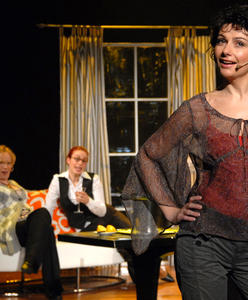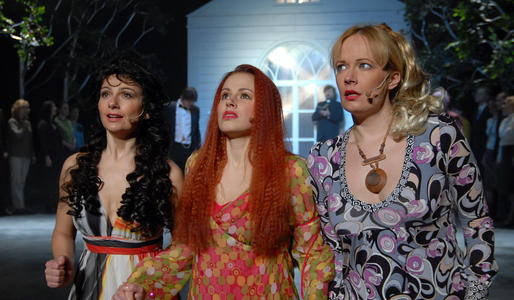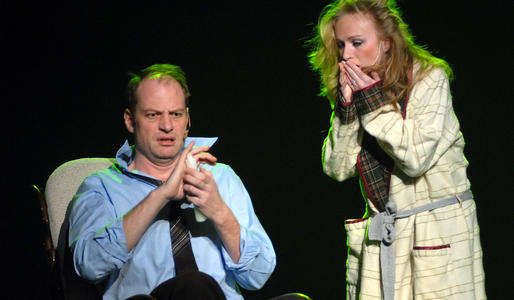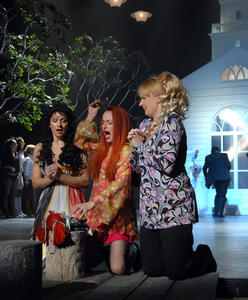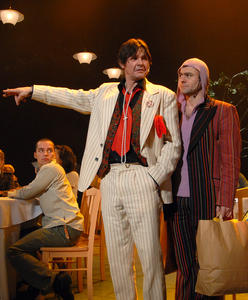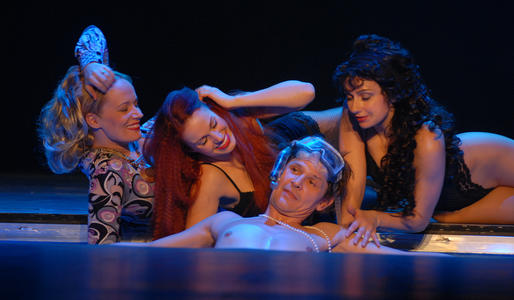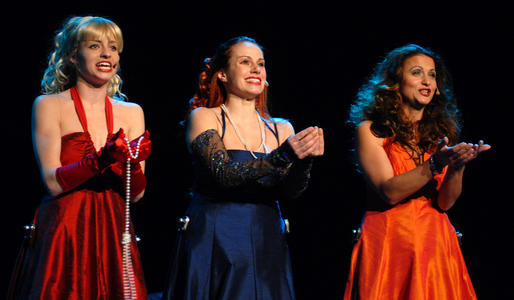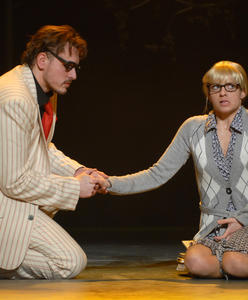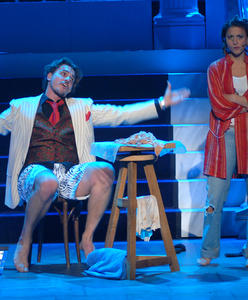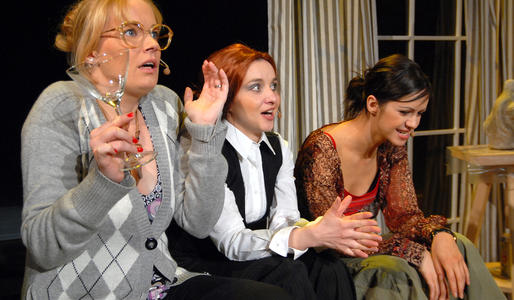Witches full of stars
Jiří Renč 3. November 2007 zdroj TV Magazín
The famous musical ‘The Witches of Eastwick’ has finally reached Prague. The film version of the novel of the same name, with Jack Nicholson, Cher, Susan Sarandon and Michelle Pfeiffer, was filmed in 1987 by an American director, George Miller. The musical version was developed for a Czech audience by director Stanislav Moša, and at present is Brno City Theatre’s “freshest” hit. In order that Prague spectators are not cheated of the opportunity to see this musical jewel, they can now visit the Hybernia Theatre and see the magical story of Alexa (a sculptor), Jane (a teacher) and Sukie (a journalist), women whose strength lies in their creativity and feminine completeness, and the dominant male figure, Darryl van Horne, a connoisseur of life and women who also has supernatural features and abilities.
In the leading roles you can see many actors and actresses known from the theatres of Prague and Brno, as well as from films and TV. For example, Hana Holišová (‘Velmi křehké vztahy’), Alena Antalová (‘Četnické humoresky’ and ‘Pojišťovna štěstí’), Jitka Čvančarová (‘Ordinace v růžové zahradě’) and Radka Coufalová-Vidlák all alternate in the role of stuttering Sukie. The role of Jane is filled by Markéta Sedláčková and Johana Gazdíková, and Alex is played alternately by Ivana Vaňková (‘Četnické humoresky’), Jana Musilová (chanson singer and presenter of Czech TV programme ‘Sama doma’) and Yvetta Blanarovičová (‘Pojišťovna štěstí’). Spectators can see Petr Gazdík, Martin Havelka and Petr Štěpán as Darryl van Horne, while Dušan Vitázek and Jakub Uličník alternate in the role of Michael.
A musical theatre glowing with professionalism
Vít Závodský 6. August 2007 zdroj Týdeník rozhlas
Although today it is pretty normal to meet with musical productions in a variety of ‘standard’ theatre settings, there is nothing astounding about stating that Brno City Theatre has worked its way up to being an authorial and interpretational centre for such productions in the same league as the theatres of Prague, with their ad hoc mega-productions. Brno City Theatre is garnering well-deserved praise not only at home in Moravia, but also during guest appearances in Prague and during its many tours abroad. In fact, the work of the theatre abroad is now running in parallel with that in Brno, featuring not only grand audition proceedings but also pre-premieres in foreign languages of various productions which are only then performed in Brno. The most exceptional aspect of their activities is their output of original material, the central pillar of which is the authorial-directorial co-operation of the director Stanislav Moša with a closely-knit group of local composers (Zdenek Merta, Petr Ulrych, Miloš Štědroň, the Střežený Parnass collective). The rich, practically constantly sold-out offerings of “the theatre which speaks, dances and sings”, naturally has its qualitative ups and downs, but cannot be faulted for its dramaturgical single-mindedness and the courage to take risks, its marketing support, and particularly the systematic placing of great demands for the highest possible level of professionalism from all elements of the final synthesis on stage.
Most of the theatre’s successful productions (from the previous two seasons we should at least mention the local productions Hair, The Garden of Miracles, Nanu, If A Thousand Clarinets, Jesus Christ Superstar and Joseph and the Amazing Technicolor Dreamcoat), which bear witness to the great variety of themes that the theatre deals with - a selection hardly chosen for ease and convenience, have received relatively little detailed coverage from us. By way of repaying a little of our ‘debt’ here is some brief information about the recent exceptionally successful production that was the Czech premiere of London’s musical hit comedy The Witches of Eastwick, by librettist and song-writer John Dempsey and composer Dana P. Rowe.
A trio of lonely middle-aged women – the sculptor Alex, musician Jane and journalist Sukie – in a relationship with the diabolically mysterious and charming Darryl van Horne – get into conflict with the prudish, conservative surroundings of the small American town in which they live, ruled by the dictatorial moralist Felicia
Gabriel. The basic story has several different versions, from Updike’s original novel (1984), through Miller’s “star-studded” film (1987) to the current theatre version. Director Moša’s proven team (exceptional translator Jiří Josek, dramatist Pavlína Hoggard, choreographer Igor Barberić, conductor Jiří Petrdlík, scenographer Jaroslav Milfajt) interpret it as a confrontation between the dreamy carefree years of youth, and – mainly – the risky, fantastic but beneficial process of individual emancipation, the search for and finding of one’s confident self. The precise artistry of the large live orchestra, the dynamic crowd scenes with their songs and movement, the high points of the individual performances and songs, the special effects (pyrotechnics, a functional swimming pool, a violoncello which comes alive, the destruction of a church, the actresses taking flight) all going off without a hitch, and the great typecasting of actors in groups of three or even four alternative performers – everything contributes to the quality of this production (which is such that a CD had to be quickly released), which in the context of Brno’s ‘musical factory’ is by far one of the best.
Witches’ Sabbath in Brno
Josef Herman 6. March 2007 zdroj Divadelní noviny
The musical ‘The Witches of Eastwick’ (performed for the first time at the Theatre Royal, Drury Lane in London on 18th July, 2000), was written by librettist John Dempsey and composer Dana P. Rowe and is a textbook example of musical writing. This is already visible in the brilliant opening scene, which swiftly delineates the contours of the setting, and ‘deals out the cards’ to the protagonists. At the end comes the ace of trumps – the devil Darryl van Horne. In George Miller’s famous film (1987) the bewitching Jack Nicholson arrives in a car driving slowly through a downpour, while in Brno Martin Havelka comes out of the trap cellar, all lit up in red as if at a house of dubious repute. He tries to ‘do the Nicholson thing’ a little, but firstly it doesn’t matter, because a little reminder of the context doesn’t do any harm, and secondly Havelka can’t overdo it because the musical differs from the film on a basic level.
The musical is improved also by the fact that as an interpretation it returns somewhat to the original piece, the novel by John Updike (1984). He whipped up a storm of discussion about feminism, with a depiction of three women on the border of middle age, free from the ties of marital and household duties. With amusement, Updike glosses over the emancipation of women as just another of those revolutions from the end of the sixties, presenting this pastiche of witchery in a slightly cheeky reference to American society’s drastic experience with witch-hunts – remember Miller’s play The Crucible. In the Czech Republic we have The Hammer of the Witches (Kladivo na čarodějnice). The personalities of the three women; a journalist, a musician and a creative artist (those emancipated professions!) runs counter to the values of the conservative American community in which they live. It wasn’t far to go from their free-thinking indulgence, their using of men for one thing only, for their ‘hen-nights’ with Martini, cards and discussions about sex, to the half serious, half in jest idea of having a witches Sabbath. In Updike’s novel they actually killed the wife of Darryl van Horne (the devil of the film), who in the original was but a bankrupt small-businessman running away from his creditors, using remote Eastwick to regain self-confidence until his creditors kicked him out of even there. The film-makers changed him into the devil, and the three witches became something like his victims in his attack on the pious local citizenry, in order that they could film drastic horror scenes in which the women liquidate their seducer with a barrage of black magic. It’s hard to imagine, however, why they did this – they had no better reason than a rather unbelievable fear of being judged by the ‘decent’ local community to which they had shown obvious disdain. It’s not surprising that the writer didn’t enjoy the film: It’s a film I wouldn’t want to see twice, but I managed to remain in my seat till the end – I couldn’t bring myself to read the screen-play though.
The musical version takes the ‘film Darryl’ as a sort of devil, but is rather focused on the ‘war of the sexes’, i.e. the theme of Updike’s book. He’s basically a charismatic man, the most masculine that has ever been seen in that backwoods town, and finally an equal partner and competitor for these emancipated ladies. And is he the devil? There have been many such devils throughout the history of theatre, and few have needed to believably justify his existence. The main thing is that his initiating and organisational role in Dempsey and Rowe’s story avoids the thematic problem of the film, but brings some young lovers into it (the man is actually the son of one of the witches), before whom the witches eventually feel ashamed of their sins and feel compelled to kick Darryl out in the same way as in the film, though not so drastically. This spell-casting comes across as being a bit theatrically naive, and contrasts with the splendour of the other scenes.
Another import from the film into the musical is the conservative moralist Felicia, there more like an innocent victim of diabolical games, here the defeated local dictator, with her ossified moral code. The drastic murder scenes were thankfully tamed for the Brno stage. Of course, the famous magic-making scenes couldn’t be left out; in fact, they had to be in there as a condition for the granting of the right to perform the musical. Brno’s theatre has carried out tricks and stunts galore, but they’ve never coped with such complex things. Normal theatre technology was enough for something small, for example the trap cellar, used in a reasonably simple trick where Felicia’s husband drowns in the kitchen sink. More complicated, though still basically a mechanical affair, was the destruction of a church – a building as big as the stage. The crowning glory of the production is two masterpieces: the seduction of the musician, Jane, which takes place during the passionate playing of a violoncello (in the film it was the famous concerto in H minor by A. Dvořák!), which comes to life on stage, turns around and catches fire, and secondly, just as in the most famous sequence in the film, the witches freely float into the air (Brno hired some foreign specialists to take care of this).
But even without all this pizzazz, the story, lyrics and music of The Witches of Eastwick would be among the best produced for musicals in the last decade, against a background of shallow attractions, historical super-cliché and idyllic retro-style. ‘Witches’ seems to have returned to the golden years of the first half of the 20th century, when musicals sang, spoke and danced for a reason, and not just to confound the senses. It’s no accident that Dempsey and Rowe already have similar works behind them, Zombie Prom (1995, about life at an American high school, with elements of horror) and The Fix (1997, a satire about political corruption). Finally, musicals with a clever storyline full of jokes, contexts and relevance!
The success in Brno of ‘Witches’ was greatly helped by Jiří Josek’s translation, which is not only perfectly speak-able and sing-able, but also adequate in its linguistic and stylistic playfulness which translates the significant nuances of the story and situations into a contemporary environment. That not one gag fell flat can be attributed to Stanislav Moša’s excellent direction. He needs no diabolic crutches, and manages with the natural, believable reactions of natural people, who are admittedly a bit crazy, but that’s what all people are like that don’t follow the herd, and deal with their troubles in true ebullient ‘musical’ style. The fun is supported well by Igor Barberić’s witty choreography.
This perfectly tuned, technically complicated theatre company and precise orchestra is a solid base on which to showcase well-cast solo actors (how the alternative actors will fare can’t be guessed). Martin Havelka does a superb job of portraying narcissistic but attractively self-centred masculinity; he’s a rough yet sensitive guy who can get away with anything in the world, and with women. Ivana Vaňková as Alexa, Markéta Sedláčková as Jane and Alena Antalová in the role of Sukie are good-looking, healthily eccentric, taking their characters through the volatile states of the female mind and spirit. They sing fantastically together! No less perfect is Zuzana Maurery, who had to bring her character, Felicie, to a state of eccentric loopiness. Her movingly defenceless husband Clyde, totally under her thumb, was played by Igor Ondříček.
This diabolical tale is in Brno mainly about the need to, at least once in a while, let your imagination go wild, fly off the handle and dream, before once again descending into boring reality. It is definitely better than debating about feminism or frightening ourselves with ghosts. The Witches of Eastwick have become one of the staple musical productions of the Brno City Theatre, which seems to be a position well-deserved.
The Witches of Eastwick: An ‘adults only’ musical!
19. February 2007 zdroj Rytmus života
This new musical from Brno is distinctive in the quantity of its erotic scenes and vulgarities, and the masses of never before seen stunts!
The premiere of ‘The Witches of Eastwick’ filled the Brno City Theatre up to the roof. And why not, who wouldn’t wish to see Alena Antalová levitating in the air, or actors splashing in a real swimming pool right up there on the stage?! They shone despite the severe cold!
A key role in the production was played by Martin Havelka as the demonic Darryl, and also Alena Antalová as Sukie. She gave an excellent performance despite the fact that just before the premiere she came down with some kind of virus – she told her colleagues: ‘I was at the chemists yesterday, I feel like I’m on my last legs.’
Rating the musical
This new work from the Brno City Theatre definitely won’t have any problem enchanting its audiences! Bravura acting performances and a great many stunts never before seen in these parts: there are flying actresses, there’s a swimming pool in the centre of the stage, and an avenue of cherry trees flower and their cherries ripen right before the eyes of the spectators!
They want rock or blues, and have the devil inside them
Jiří P. Kříž 17. February 2007 zdroj Právo
Moša's Witches of Eastwick is no shooting star - it glows and zooms on and on at interstellar speeds. Does it or doesn’t it matter that only a few of the enthusiastic spectators at the premiere of this new, exceptional musical from the Brno City Theatre are aware of the historical, political, social and cultural background to the work? This remarkable work, which represents the highest qualitative point ever attained in our country, is ‘The Witches of Eastwick’ by John Dempsey and Dana P. Rowe.
If you can find anyone after the premiere of ‘Witches’ who still doubts the importance of the Brno City Theatre in the European context, believe me they are worth calling a misomus. This word is long dead, and the exact meaning is only known to the educated Jesuit Jan Blahoslav. Such an enemy of art and education can basically be called an idiot, if we want to express the term in a way understandable to our time.
With Europe at their feet
First perhaps we should bow down to the production team. Translator Jiří Josek, who together with Michael Prostějovský is one of the best to be found in the world of Czech musical theatre. To simply jump to this from Shakespeare or Saroyan… Director Stanislav Moša is criticised for everything under the sun by misomuses (that’s right, idiots), but his untouchable successes both at home and in Europe can only be envied by them. If only my home town of Brno would realise this more clearly! Regarding choreographer Igor Barberić – he has found his place in Moša’s team, knows how to be original and does his country proud – the land of his birth being Croatia, a place typically looked down on by Czechs. Deserving of praise is scenographer Jaroslav Milfajt, with his sense for realistic detail, and costume designer Andrejka Kučerová, who deserves at least the Order of Work medal for her inexhaustible invention.
I don’t know why, but the dramatist is always mentioned last. In the case of the ‘Witches’ Pavlína Hoggard. She knows her craft and is Batman in women’s clothing. You can meet with her currently on both the West End and Broadway. Search the Czech Republic and find me someone of her generation in the musical genre that is so educated!
Other connections
It would be enough if the only thing tempting you to visit this production of Brno City Theatre was George Miller’s 1987 film of the same name. With Cher, Susan Sarandon, Michelle Pfeiffer and the heavenly Jack Nicholson in the role of the diabolical Darryl. Even if making comparisons with this film, Brno audiences will not disappointed by ‘Witches’.
I can inform hardened intellectuals who look down their noses at musicals that both the film and the stage version of ‘Witches’ are based on a magical novel by John Updike. And this person of real authority for people concerned with literature. If not, then see the above note on misomuses (idiots)! Everyone fondly remembers the meeting with him at that famous, defiant, highly suspicious Brno exhibition “Contemporary American Theatre” at the Dům umění (House of Art) in 1986.
Updike’s Eastwick is in New England. Not far away, at the end of the 17th century in Salem several tens of people were hung or tortured to death for witchcraft (in America witches were not burnt). This is again for those perceptive of history…And in the end, Alexandra Berk ova best judges how masculine Updike manages to deal with the feminine characteristics of the witches Alexia, Jane and Susie. In the novel it was very well done, in the musical it isn’t so much his problem.
Daisies over Brno
For the premiere of The Witches of Eastwick Moša managed to collect together into one evening the crème de la crème of contemporary musical talent. Most of all, Martin Havelka, who’s Darryl easily bears comparison with Nicholson’s (it already occurred to me to compare the two in connection with the performance of One Flew Over the Cuckoo’s Nest). Havelka doesn’t have to play the devil – he IS him: rough and earthy, attractive to women, appeasing of the theatre’s critics. His astounding journey from Pospíšil, Brüstl a Trnková-Hauserová’s Potato Day way back at the Husa na provázku Theatre!
Ivana Vaňková, Markéta Sedláčková, Alena Antalová – witches! Exact, even if the roles have been adapted to their specific real personalities. Peerless gems of the musical acting scene! Sovereign, perfect! And not only that, devilishly beautiful, Sedláčková and Antalová even in a motherly way. Antalová in dignified pregnancy.
Ján Jackuliak as the imp Fidel. He almost has no role, but the performance! Bravo! Igor Ondříček – Clyde, drinking his way through marriage and ending his life in a sink rubbish grinder. Bravo! Zuzana Maurery – unpleasant, bossy Felicie. Bravo! And our young Mária Lalková, Dušan Vitázek - Jeniffer and Michal...
Such professionalism, and I have only named the main roles in the premiere performance – there is also the alternating cast of Blanarovičová, Gazdíková, Coufalová-Vidlák, Čvančarová, Gazdík, Štěpán, Sagher, Němec, Herfortová, Bartolšicová, Fojtová, Uličník...
I could not recommend Moravia (let’s leave Prague to its unsuccessful commerciality) a finer piece than Moša’s Witches of Eastwick. A musical of European stature!
Brno’s ‘Witches’ – a sexy spectacle
Luboš Mareček 16. February 2007 zdroj MF DNES
All those people out there who (often rightly) turn up their noses at Czech home-grown musicals will be bowled over by The Witches of Eastwick. Entertaining, but never shallow, this production is musically interesting and sports an inspired plot.
It only took six years for this work of Americans John Dempsey and Dana P.Rowe to reach the Czech Republic. The famous novel by John Updike and the well-known film with Jack Nicholson are this musical’s precursors, and as with them it is about three insecure women. Darryl, their charismatic seducer, returns the three to an active sexual life, but more fundamentally, brings them self-confidence. In the musical he is a cynical lady-killer, but unlike in the film he is not from hell; his devilish influence springs from elsewhere. Darryl has no complexes, and despises the banality of life in Eastwick as much as its pseudo-morality.
Praise for the Czech version of ‘The Witches’ can begin with Jiří Josek’s fine translation, which never loses pace. In this dynamic story Darryl can be heard to sing, just before his humiliation that one has to be “a guy with balls”. Another positive point is the ‘flavourful’ musical version from Jiří Petrdlík. The sound of the orchestra is beautifully full, and the music, which erupts into fine swing style in places, sets everyone’s legs a-tapping.
The director, Stanislav Moša, is well aware that he’s working in a genre where audiences expect most of all a good show. Luckily, he keeps the showers of fireworks within reasonable limits and avoids stifling the principal idea behind this work, which is not about the immortal spirit, but rather about the freedom to be oneself. The first act ends with something audiences are bound to love – the levitation of the three heroines up to the top of the stage. The technical capabilities of the theatre also enable a swimming pool containing almost five tons of water to be used on stage.
The crowning glory of this musical, however, is the premier-quality performances of the witches. Alena Antalová, Markéta Sedláčková and Ivana Vaňková are experienced musical actresses. Martin Havelka also does justice to his role as the diabolical, hormonally driven Darryl, balancing humorously between overblown masculinity and the compulsive importunity of a skirt-chaser. The star of the show is Zuzana Maurery as the repulsive evening Felicie, who keeps her husband and in fact the whole of Eastwick under her thumb. She manages part, one of the most difficult, with bravura. Moša has not merely created a pretty musical comedy. All of the theatrical elements fit together and complement each other beautifully. This new musical hit from Brno represents modern musical theatre at its best. A well-written and finely-crafted musical can be an intelligent form of entertainment – and on top of that a truly sexy spectacle.
Amazing Witches
Jan Šmikmátor 13. February 2007 zdroj Rovnost
A new hit and magnet for audiences has been born at the Brno City Theatre.
The Czech premiere of the musical ‘The Witches of Eastwick” directed by Stanislav Moša, took place there last weekend.
This great musical set-piece used many of the almost unlimited possibilities offered by the technically advanced new building of the ‘Music Scene’. Set designer Jaroslav Milfajt carried out his traditional excellent work, as did costume designer Andrea Kučerová.
The production is also ‘spiced up’ a bit by the presence of Prague actress Yvetta Blanarovičová. The story is simple: three women at the beginnings of middle age dream into existence a man (with a capital M), who causes a great stir in the narrow-minded town of Eastwick.
Just like during Friday’s rehearsal, at the Sunday premiere Radka Coufalová-Vidlák gave an incredible performance as one of the witches. She’s already got one Thalia in her pocket (from last year), and it looks like she might be deserving of another one for Sukie.
Also deserving of praise are Lenka Bartolšicová as Felicia Gabrielová and Ján Jackuliak in the role of Darryl’s servant Fidel. The swinging musical ‘The Witches of Eastwick’ offers a quality spectacle and will be battling with the piece “Gypsies Go to Heaven” for the title of most successful musical of the season.
An invitation to the theatre
J. G. Parma 1. December -1 zdroj Boskovické noviny
Brno City Theatre can be proud of being one of the few theatres to be given the right to perform John Dempsey and Dana P. Rowe’s musical ‘The Witches of Eastwick’, the earlier film of the same name being very famous.
It is necessary to say that the Brno version has also been extremely popular, although it can be expected that any new musical work directed by Stanislav Moša will pack the Music Stage to the roof.
As is customary with such productions, the roles are again played by alternating actors. During the performance which I saw, the cast was absolutely fantastic. All the roles, though I can only mention the main ones. Alexandra was played and sung by Ivana Vaňková, Jane by Markéta Sedláčková and Sukie by Alena Antalová. I let the ladies go first, so now I should mention Martin Havelka in the role of Darryl.
The production was brimming over not only with a great story but also with unusual, almost magical stage tricks.
On the Drama Stage a new work was introduced, an adaptation of Comenius’ ‘The Labyrinth of the World and the Paradise of the Heart’, this version being by Aleš Bergman (also directing) and Jan Šotkovský. If you are one of those who remembers the production, way back, of the same work by Ludvík Kundera at the Divadlo Husa na provázku (Goose on a String Theatre), you won’t find any similarities here.
In the contemporary production there are two guides, these being Ubiquitous (Jan Mazák) and Delusion (Radka Coufalová -Vidlák), while in the role of the Pilgrim there are always different actors and actresses every chapter, with one exception.
It is possible to say that this production is a highly understandable presentation of a classic text, and it could certainly serve as a welcome addition to normal school studies. Adults, too, can find in it things relevant to them.
The Witches of Eastwick
David Kroča 1. December -1 zdroj Český rozhlas 3, Vltava
Brno City Theatre is staging the musical “The Witches of Eastwick” for the first time only six years after its world premiere in London. This tour de force is probably going to pay off for the theatre on Lidická ulice, as the musical version stands up well in comparison with its predecessors, the successful novel and film. The main plot follows the story of three downtrodden middle-aged women vainly longing for excitement in the middle of a boring little town. Their hidden desires are fulfilled by the arrival of diabolical Darryl, who not only seduces all three of the friends, but also teaches them how to live life to the full.
In the musical adaptation, in contrast with both the book and the film, there are no dominant horror scenes or existentialist Faustian motifs. Director Stanislav Moša has staged The Witches of Eastwick as a musical comedy, in which the audience are frightened only by doses of black humour, and nothing fateful is resolved. The most striking thing to emerge from the proclaimed labyrinth of themes is the idea of newly-regained self-confidence, the bringer of which is seductive Darryl. The sculptress, Alexa, learns how to create with passion, cellist Jane is shown the secrets of music, and in stuttering journalist Sukie the capability awakes to speak without impediment.
The effects of magical activity on the inhabitants of Eastwick are created with the aid of special effects. Scenery designer Jaroslav Milfajt has created the magical interior of Darryl’s palatial home with extensive staircases and a functional pool, and spectators may also be surprised by the violoncello that plays itself with its bow, or the real flying of the witches above the stage. What’s nice about the choreography of Igor Barberić is how he satirises the classic chorus line dancing found in musical productions, most successfully in the scene where town inhabitants, sorted strictly into lines under the self-appointed guardian of morality Felicie, clean dirty washing both metaphorically and literally.
The success of the production is guaranteed first and foremost by the star cast in the leading roles, which are as a rule played by up to three alternating actors. During the performance which I visited, by far the best was Yvetta Blanarovičová in the role of raven-haired sculptress Alexandra. She dealt with the transformation of a bored mother with an adult son into an attractive lady with the light and natural touch of a born actor. She was seconded very successfully in both the singing and acting scenes by Markéta Sedláčková as the musician Jane, and Radka Coufalová-Vidlák as the scatterbrained journalist Sukie. Coufalová also impressed with her stirring interpretation of the song Jak mám to říct (“How Can I Say It”), after which the audience rewarded her with a well-deserved ovation. Petr Gazdík, Petr Štěpán and Martin Havelka alternate in the role of demonic Darryl. What I really loved about Petr Štěpán’s interpretation was his self-mocking rendition of Darryl as a charismatic hunter of women, who sees seduction as his noble calling.
Without a doubt, the audience was rather pleasantly surprised by the music, until now unknown in this part of the world, played in Brno by an orchestra over 30 members strong under the direction of Jiří Petrdlík. The musical swaps genres from classic swing to spirituals, and offers a series of challenging pieces which work perfectly in the context of the performance, though it’s doubtful you’ll be humming them once it’s over. The Witches of Eastwick basically lacks even one readily memorable tune. This, however, is maybe the basis of the musical’s exclusivity: it’s something singular and special, with its magical atmosphere acting on you in the here and now.
Eastwick wasn’t enough for the ‘Witches‘ – they’ve successfully moved to Brno
Vladimír Čech 1. December -1 zdroj KAM – supplement no. 4
The musical “The Witches of Eastwick”, which had its world premiere in London’s Theatre Royal, Drury Lane on 18th July 2000, is an adaptation of two preceding works of the same name – John Updike’s novel (1984, in Czech 1993), and the film with Cher, Susan Sarandon, Michelle Pfeiffer and Jack Nicholson (1987), which has been shown in the Czech Republic. The authors of this work are John Dempsey (libretto and song texts) and Dana P. Rowe (music).
Eastwick seems not to have been enough for the ‘Witches’, as they have spread their web of enchantment to the Music Stage of Brno City Theatre, this in fact being the Czech premiere (10.2. this year). Their move, under the direction of Stanislav Moša was evidently a good one, judging by their grateful and enthusiastic audiences.
A characteristic trait of this musical comedy is that the people in the centre of attention are not the young, but rather representatives of the ‘middle-aged’ generation, their youthful charms on the brink of fading, an event which cannot be prevented even by their skilful magic. They are awoken from a state of reminiscent lethargy by a man they dream up, Darryl van Horne, who helps them to lead a fuller, richer life. This idea is expressed to the full in Brno, even though it’s hard to see middle aged women in the youthful actresses playing the witches here.
Moša’s production (though excellent choreographer Igor Barberić could be seen as a ‘second director’) is inventively colourful and dynamic musical theatre, in which both the eyes and ears are sated. There’s no shortage of ideas, or magic either: the witches really fly, a bow plays a violoncello by itself, the flames of hell erupt, prudish Felicie spits pips, a silver dollar and candles etc. You need not be afraid, however, and you are in no danger of being corrupted by it – everything is served up with a healthy dose of irony.
Scenographer Jaroslav Milfajt has gifted the devilish Darryl with a luxury residence, complete with swimming pool, in which this Don Juan splashes around like a fish in water. Andrea Kučerová designed the costumes, which give a ‘slightly retro’ look to the simple citizens of Eastwick.
Jiří Petrdlík is responsible for this version of the ‘Witches” and he also directed the premiere (alternating with Dan Kalousek). While foreign theatres rely on playback or several ‘all-purpose’ synthesisers, in Brno several tens of musicians are kept busy playing for the production.
The main roles are filled by pairs and mostly trios of alternating actors, and in the role of Felicie four have been announced. The three witches falling under Darryl’s spell in the premiere were Ivana Vaňková as the sculptress Alexa, Markéta Sedláčková as the music teacher Jane and Alena Antalová as local newspaper editor Sukie. The way in which she performed the song “Jak to mám říct” (How Can I Say It), in which the normally stuttering journalist, under Darryl’s influence gradually gains the ability to speak with great speed and loquaciousness, is a chapter in itself.
The fact that the Witches of Eastwick/Brno are absolutely bewitched by Darryl is definitely flattering for the actor playing him in the premiere, Martin Havelka. In order that his sex appeal does not, God forbid, diminish over many repeats, Darryl is also played by Petr Gazdík and Petr Štěpán.

